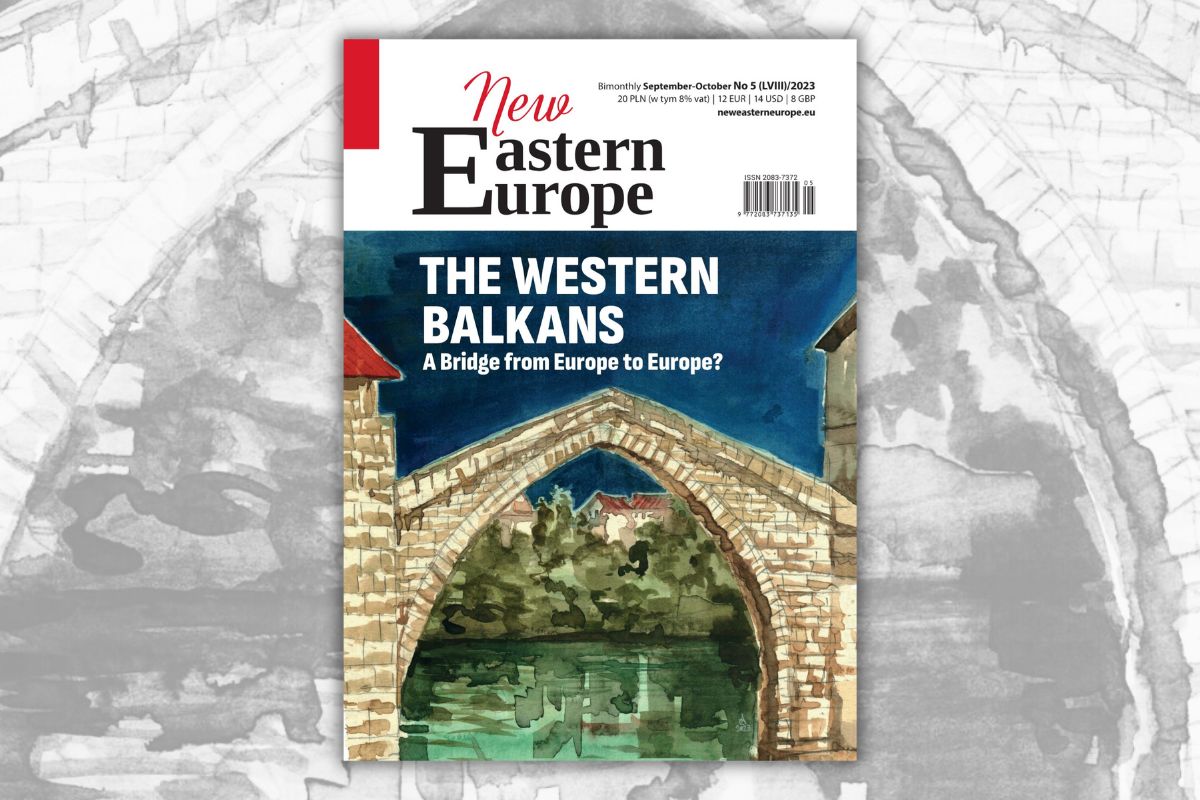Issue 5/2023: The Western Balkans. A bridge from Europe to Europe?
The September-October 2023 Issue of New Eastern Europe is now available. Find out what’s inside and how to get your copy.
September 12, 2023 -
New Eastern Europe
-
Issue 5 2023Magazine

![]()
Click here to subscribe and get access to this issue plus all previous issues
To purchase a single copy of the issue click here
The ongoing war in Ukraine has brought the debate over the future of Europe back to the region of the Western Balkans, which not that long ago also experienced the brutality of war, mass murder, and hatred, resulting in ethnic cleansing as well as physical devastation and long-term trauma and divisions. Indeed, the Balkan wars, waged in the 1990s between the nations of a once federal state, are a cruel reminder of the dangers of uncontrolled ethnic nationalism and what weapon it can become in the hands of narcissistic leaders. The lands of Europe have seen the consequences of such emotions too many times.
 The establishment of the European Community, first, and later the European Union, was meant to ensure that such violence would never come back. In this way, the experience of Western Balkans and the struggle of its states to integrate with the EU is the story of Europe which – at the same time is haunted by its often brutal past, and – through establishing connections with others – frees itself from it. So why, some would ask, are the states in the region still in the waiting room of the spacious European house? Why have they been there for such a long time and does the war in Ukraine have any effect on their European path?
The establishment of the European Community, first, and later the European Union, was meant to ensure that such violence would never come back. In this way, the experience of Western Balkans and the struggle of its states to integrate with the EU is the story of Europe which – at the same time is haunted by its often brutal past, and – through establishing connections with others – frees itself from it. So why, some would ask, are the states in the region still in the waiting room of the spacious European house? Why have they been there for such a long time and does the war in Ukraine have any effect on their European path?
One answer holds that the mistakes of the past (also made by the West) have led to the unfavourable status quo and thus need rethinking. This is especially true for the Serbia-Kosovo conflict which – clearly – needs a fresh look and an approach that would – nonetheless – be acceptable to both sides. Serbia, especially, is a country to keep on the radar, mainly due to the fatigue of its population with the lengthy and mundane EU integration process. The failures of this process can easily and effectively be exploited by Russia, which traditionally holds a strong position within the country and continues to promote the anti-EU and anti-NATO narratives. But, these messages go beyond borders, in many cases reaching even established democracies as Slovenia.
All these topics are discussed on the pages of this issue by our authors who specialise in the region and through their writings shed light on some key developments and phenomena to follow. Their perspectives may differ, yet they all show that while the eyes of the international community are in a great majority turned towards Ukraine, history has not yet ended in the Western Balkans. The experiences of that region should be treated just as seriously and approached adequately. Also in Brussels and Washington.
Contents
The Western Balkans and Europe
Twenty years later. Exposing the hidden cause for the delayed EU integration of the Western Balkans Antonios Nestoras
Cake doughnuts and western diplomacy Leon Hartwell
Kosovo-Serbia dialogue. A perpetual state of stagnation Visar Xhambazi
Serbia continues to walk the tightrope Marta Szpala
Russia’s (fading) influence Katarina Tadić
Nationalism is still a potent force in Bosnia and Herzegovina Hikmet Karčić
Jewish connections in the Balkans and Eastern Europe Adam Balcer
Former Yugoslav nations deserve peace An interview with Gojko Božović
Interviews
Kundera’s warnings are still relevant today A conversation with Samuel Abrahám
Essays and Analysis
The anatomies of evil Simona Merkinaite
The Kakhovka Dam explosion as Russia’s scorched earth tactic Zakhar Tropin
No school for the children of Izium Kateryna Pryshchepa
The Five Towers of the Kremlin Vakhtang Maisaia
Rethinking Russian, East European and Eurasian Studies in the West Veronica Snoj
The weaponisation of music in today’s Russia Tatevik Hovhannisyan
Slovaks seek a sense of normalcy Michaela Terenzani
A regional player? Nikodem Szczygłowski
Stories and ideas
Orwell’s warning of totalitarianism for today Luke Harding
The spirit of Estonia’s tradition of song Isabelle de Pommereau
Gagauzian youth contemplate their future Madeleine Cuckson
The long exodus William Fleeson
How vulnerable groups live in Belarus in the era of mass repressions Volha Kavalskaya
Art, Culture and Society
Multilingual and multiple minorities. Who are the Balkan Jews? Katarzyna Taczyńska
History and Memory
The anatomy of betrayal Ihar Melnikau
The icon and the sarcophagus. Why the Golden Ring matters to the Kremlin in 2023 James C. Pearce

































